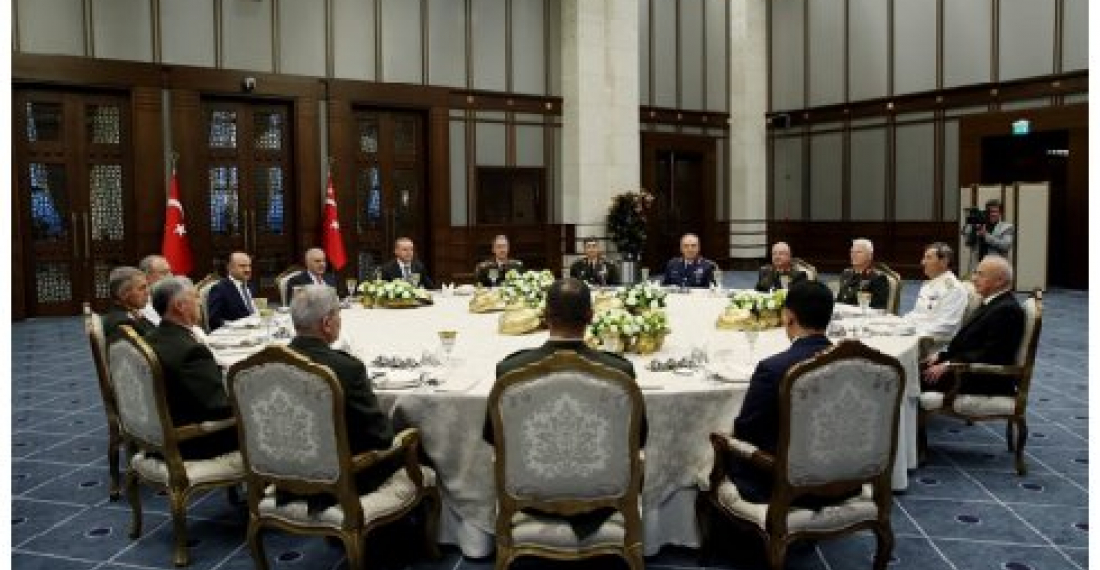Turkey's Supreme Military Council on Thursday (28 July) held its first meeting since the failed military coup on 15 July. The meeting chaired by Prime Minister Binali Yildrim decided to keep in place the officers in the upper echelons of the military since they were not involved in the coup attempt, and had remained loyal to the government. It is reported however that the Council started discussions on radical changes to the Turkish Armed Forces.
President Recip Tayip Erdogan later in the evening hosted the military commanders to dinner at the Presidential Palace in Ankara.
Relations between president Erdogan and the military chiefs has in the past not been easy. The situation after 15 July has however changed completely this relationship. The initiative is now no longer with the military but with the politicians, and for the first time in Republican Turkey civilian control of the armed forces is emerging as a fact, one of many developments happening at lightining speed, and which are bound to define Turkey for many decades to come.
In the mean time the role of the Gulenist movement, also known as the "Hizmet" Movement or "cemaat" has become a matter of fascination in Turkey and beyond, as new details emerge of how this Movement worked, and how it had penetrated every level of the Turkish state. Whilst some are expressing concerns at the clampdown against the Gulenists and have warned against witch hunts, popular mood in Turkey is at the moment critical of the movement, with some demanding revenge and retribution.
In an analysis of the significance of the events of the last two weeks, Dennis Sammut, recently back from Turkey where he observed ongoing processes, writes for commonspace.eu:
Two weeks have passed since the failed military coup in Turkey, and the dust of the tanks on the streets of Istanbul, and the bombs dropped on Parliament and the government buildings in Ankara has hardly settled. Yet it is already possible to say that 15 July was a defining moment in modern Turkish history, and that things in Turkey will never be the same again.
Dennis Sammut adds that "the collapse of the coup was a defining psychological moment. The Justice and Development Party (AKP) has been in government since November 2002. In most countries fourteen years in government is a long time, yet it seems that for most AKP supporters, the party only came to power on 15 July 2016. Up to that point there was a lingering awe and fear of the military. That awe and fear has now gone".
In his analysis, Sammut adds,
"Erdogan is a shrewd politician who mastered the art of timing. He has used the euphoria of the last days to strengthen his position, and will milk the moment to the full. When that is done however he will know when to stop. This is partly because he knows that his party is not a monolithic institution, but a broad popular movement. Going forward he will need the support of both the Party and the wider society. So whilst clamping down severely on the Gulenists, Erdogan has in the last days offered an olive branch to the mainstream opposition – the secular CHP and the nationalist MHP. He has not yet gone so far as to do the same to the pro-Kurdish party, the HDP, but there are some signs that he may even be ready to do that."
You can read Dennis Sammut analysis of events in Turkey on commonspace.eu here.
The unusual alliance between the Islamist oriented AKP and the secularist CHP - the Party that sees itself as the guarantor of Turkey's secularist tradition and the memory of its architect, Kemal Ataturk is explored in an opinion piece by Murad Nassibeyli, an Azerbaijani independent commentator writing for commonspace.eu
Nassibeyli says that "Until the AKP-Cemaat divorce in 2012, the politics in Turkey was all about the struggle for power between the Islamist AKP-Cemaat alliance and secular Kemalists". The author however says that after 2012 things changed, and the events of 15 July now define the relationship between the AKP and the kemalists in a very different way. "Currently, not only at the high level but also at the level of ordinary people, Erdogan is largely enjoying the support of Kemalists. The rationale behind their support to Erdogan’s crackdown on the Cemaat is mainly that cleansing the Cemaat from the state institutions, and curbing their influence in the country, could only be possible under such a powerful authoritarian leader as Erdogan - who has already tightly consolidated power in his hands".
However Nassibeyli does not think that the alliance between the AKP and the Kemalists will last very long: "Even if AKP assures the Kemalists on the issue of secularism, the issue of democracy in the context of further power consolidation in Erdogan’s hands, and his push for transformation into a strong presidential republic, will be the main topic of upcoming years of the Turkish politics. Thus, one should not expect the current approximation between Kemalists and AKP to be a long lasting factor in Turkish politics."
You can read Murad Nassibeyli's op ed on commonspace.eu here
source: commonspace.eu
photo: President Erdogan hosts the top commanders of the Turkish Armed forces to dinner two weeks after a failed military coup the consequences of which are re-defining Turkish politics. (picture courtesy of the Turkish Presidency)






